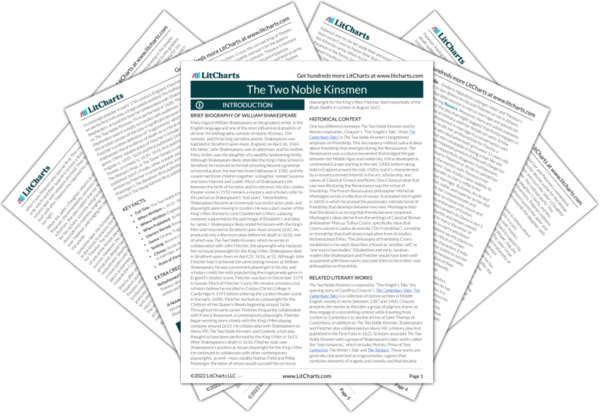The female characters in The Two Noble Kinsmen don’t enjoy the same freedoms and intellectual treatment as the male characters, largely because of the sexist cultural climate in which the play was written. Although women hold some power or agency, they often lack the means to exercise this power directly and must convey their thoughts and wishes through male characters. For example, Emilia convinces Theseus to spare Palamon and Arcite their lives in Act 3, Scene 6, but not by her power of persuasion alone. Instead, Emilia convinces Theseus by appealing to an earlier oath he made to give Emilia anything she wanted. In other words, Emilia persuades Theseus to spare the cousins’ lives not because she is particularly persuasive, but because Theseus is concerned about the negative ramifications breaking an oath would have on his reputation as a chivalrous nobleman.
But the play’s women are hardly powerless. Often, female characters cast a more perceptive, attentive, and critical gaze at the issues male characters accept without question. For example, in Act 5, Scene 4, while Theseus happily accepts the odd twist of fate that leaves Arcite mortally wounded and Palamon the winner of Emilia’s hand in marriage, Emilia and Hippolyta are less convinced that the cousins’ fates were really so favorable. “Is this winning?” asks Emilia. Hippolyta, too, observes what a “pity” it is that Arcite and Palamon’s obsession with Emilia had to wreak such irreparable havoc on their formerly beautiful friendship. In turn, the female characters have something the male characters don’t: namely, the ability to think reasonably and critically about the things men foolishly take for granted. Of course, The Two Noble Kinsmen still isn’t particularly subversive in its treatment of gender roles: more often than not, the play relegates female characters to the sidelines, robs them of personal agency (nobody considers whether Emilia wants to marry Palamon or Arcite, for example), and upholds stereotypes about femininity. And yet, despite these shortcomings, the play gives its female characters the unique function of keenly observing and criticizing the action and intellectual debate from which their patriarchal society excludes them. Female characters, primarily Emilia and Hippolyta, cast a critical eye on the things male characters are quick to valorize, effectively offering a more nuanced and complicated exploration of the play’s values.
Gender and Power ThemeTracker

Gender and Power Quotes in The Two Noble Kinsmen
You’re out of breath,
And this high-speeded pace is but to say
That you shall never—like the maid Flavina—
Love any that’s called man.
Men are mad things.
It is the very emblem of a maid.
For when the west wind courts her gently,
How modestly she blows and paints the sun
With her chaste blushes! When the north comes near her,
Rude and impatient, then, like chastity,
She locks her beauties in her bud again,
And leave him to base briers.
Have I called thee friend?
I shall live
To knock thy brains out[.]
[…] To marry him is hopeless;
To be his whore is witless.
I love him beyond love and beyond reason
Or wit or safety. I have made him know it;
I care not, I am desperate.
I’ll be cut a-pieces
Before I take this oath!
No, never duke. ’Tis worse to me than begging
To take my life so basely; though I think
I shall never enjoy her, yet I’ll preserve
The honor of affection, and die for her,
Make death a devil!
What sins have I committed, chaste Diana,
That my unspotted youth must now be soiled
With blood of princes, and my chastity
Be made the altar where the lives of lovers—
Two greater and two better never yet
Made mothers joy—must be the sacrifice
To my unhappy beauty?
’Tis pity love should be so tyrannous.—
O, my soft-hearted sister, what think you?
Weep not till they weep blood. Wench, it must be.
Poor wench, go weep, for whosoever wins
Loses a noble cousin for thy sins.
Hail, sovereign queen of secrets, who hast power
To call the fiercest tyrant from his rage
And weep unto a girl[.]
Is this winning?
O all you heavenly powers, where is your mercy?
But that your wills have said it must be so,
And charge me live to comfort this unfriended,
This miserable prince, that cuts away
a life more worthy from him than all women,
I should and would die too.
Infinite pity
That four such eyes should be so fixed on one
That two must needs be blind for ‘t.













